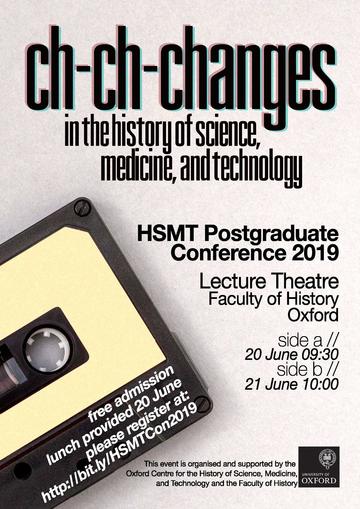2019 HSMT Postgraduate Conference: ch-ch-changes in the history of science, medicine, and technology

Welcome to the 2019 History of Science, Medicine and Technology Graduate Research Conference. Over the course of this two-day conference, the postgraduate presenters for HSMT will introduce you to the research we have been conducting over the past year. We come from all over, both geographically and academically, our backgrounds ranging from pure history to bio-ethics to medicine and our homes as close as London and as far away as Texas. With nineteen of us in the cohort this year, the range of topics is vast, covering subjects from the indigenous response to smallpox vaccinations in nineteenth-century colonial India to the social and structural barriers facing African American women in the field of medicine today.
The history of science, medicine and technology is a discipline that can and should absorb myriad others, from physics to philosophy to the history of art. Some of our research focuses on highlighting the complexities of great names in science history, such as one DPhil’s deep dive into soul-body interactions in the writings of Emanuel Swedenborg. Others of us are considering the philosophical implications of medical dilemmas, like what constitutes a good death. This year’s projects reflect the vast flexibility of our field.
The contributor of this year’s conference name, David Bowie, wrote in its namesake song a lyric that he perhaps did not initially intend to apply to a room full of historical researchers. “Strange fascinations fascinate me… turn and face the strange”. Over the course of this conference we hope to take you with us to face the strangeness of our world together. We guarantee it will fascinate you.
All welcome. Admission and lunch (on 20 June) are free, but registration is essential.
Please register here
This event is organised and supported by the Oxford Centre for the History of Science, Medicine, and Technology and the Faculty of History.
|
Thursday, 20 June SIDE A |
|
|
|
|
|
09:30-09:50 |
Registration |
|
|
|
|
09:50-10:00 |
Opening Remarks: Rob Iliffe, Professor of the History of Science, Oxford |
|
|
|
|
10:00-11:10 |
It’s A Wonderful World by Louis Armstrong Session One: Perspectives on Ecology and Environment |
|
|
Alexandra Houston, Revisiting the environmental history of malaria in England from 1600-1750 |
|
|
Lina Weiss, Magic leaves and white gold - the public image of coca and cocaine in nineteenth-century Britain |
|
|
Dilshad Teemul, On the anthropomorphisation of British biological research, up until the 1800s |
|
|
Chair: Ethan Friederich |
|
|
|
|
11:10-11:30 |
Tea/Coffee |
|
|
|
|
11:30-12:40 |
Fever by Peggy Lee Session Two: Infectious Disease in the Colonial World |
|
|
Angeliki Myrillas-Brazeau, A global history of smallpox: symptoms of colonial expansion |
|
|
Ethan Friederich, History of malaria in Assam, 1878–1947: exploring historical epidemiology, public health, medical practice, and the greater social context |
|
|
David Gawkrodger, Inequalities of health between the European and native armies in British India, 1860–1940 |
|
|
Chair: Shelley Castle |
|
|
|
|
12:40-13:45 |
Lunch |
|
|
|
|
13:45-15:00 |
Boulevard of Broken Dreams by Green Day Session Three: Darker Themes in the History of Medicine |
|
|
Samuel Weber, Mengele’s metastasis: shadows of Nazi experimentation in post-war United States healthcare |
|
|
Tizane Navea-Rogers, “Race at home”: anthropometric photography and racial typing in Britain, c. 1870-1910 |
|
|
JeeHae Kang, Victorian and Edwardian suicides: toward a good death |
|
|
Chair: Alexandra Houston |
|
|
|
|
15:00-15:20 |
Tea/Coffee |
|
15:20-16:40 |
9 to 5 by Dolly Parton Session Four: Changes in Medical Professionalism, Industry, and Warfare |
|
|
Dianne Mc Mullin, Lifting a profession: physical ergonomics in the United States |
|
|
Shelley Castle, Astonishment and confusion - the immediate medical response to chemical warfare during the First World War |
|
|
Jasmine Brown, Race and gender: roadblocks to the medical profession in the United States 1918-2018 |
|
|
Chair: Samuel Weber |
|
|
|
|
16:40-16:50 |
Closing Remarks: Roderick Bailey, Research Associate in the History of Medicine |
|
|
|
|
Friday, 21 June SIDE B |
|
|
|
|
|
10:00-10:10 |
Opening Remarks: John Lidwell-Durnin, Departmental Lecturer in the History of Science |
|
|
|
|
10:10-11:20 |
Mr Roboto by Styx Session Five: Trains, Brains and Artificial Intelligence |
|
|
Yannik Herbert, Time and punctuality on early British transport networks |
|
|
Matthew Jordan, Building brains and building minds: the connectionism/ computationalism debate, 1956-1988 |
|
|
Aaron Gluck-Thaler, The criminal in pieces: a history of vision, visualization, and pattern recognition in United States policing, 1945-1979 |
|
|
Chair: Dianne Mc Mullin |
|
|
|
|
11:20-11:40 |
Tea/Coffee |
|
|
|
|
11:40-12:50 |
What A Man by Linda Lyndell Session Six: Biographical Histories in Science and Medicine |
|
|
Dan Petrescu, Victor Babeş and the “Romanian Method” of rabies vaccination |
|
|
Julian Waddell, Curiosities in the academy: Leibniz and the public interest of science |
|
|
Vincent Roy-Di Piazza, Having “the Sign” and speaking with the dead: sources of knowledge and truth in the writings of Emanuel Swedenborg (1688-1772) |
|
|
|
|
12:50-13:00 |
Closing Remarks: Sloan Mahone, Associate Professor of the History of Medicine |


